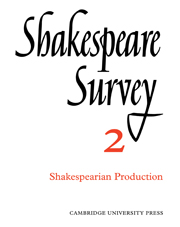Book contents
- Frontmatter
- Fifty Years of Shakespearian Production: 1898–1948
- An Original Drawing of the Globe Theatre
- The Projected Amphitheatre
- Ben Jonson and Julius Caesar
- The Booke of Sir Thomas More and its Problems
- The ‘Shakespearian’ Additions in The Booke of Sir Thomas More
- The Renaissance Background of Measure for Measure
- The Individualization of Shakespeare’s Characters through Imagery
- Trend of Shakespeare Scholarship
- Shakespeare in France: 1900–1948
- International News
- Shakespeare in New York: 1947–1948
- The Year's Contributions to Shakespearian Study 1 Critical Studies
- 2 Shakespeare’s Life and Times
- 3 Textual Studies
- Books Received
- Index
- Plate section
The Renaissance Background of Measure for Measure
Published online by Cambridge University Press: 28 March 2007
- Frontmatter
- Fifty Years of Shakespearian Production: 1898–1948
- An Original Drawing of the Globe Theatre
- The Projected Amphitheatre
- Ben Jonson and Julius Caesar
- The Booke of Sir Thomas More and its Problems
- The ‘Shakespearian’ Additions in The Booke of Sir Thomas More
- The Renaissance Background of Measure for Measure
- The Individualization of Shakespeare’s Characters through Imagery
- Trend of Shakespeare Scholarship
- Shakespeare in France: 1900–1948
- International News
- Shakespeare in New York: 1947–1948
- The Year's Contributions to Shakespearian Study 1 Critical Studies
- 2 Shakespeare’s Life and Times
- 3 Textual Studies
- Books Received
- Index
- Plate section
Summary
When critics of Measure for Measure are not staggered or repelled by the ethical presuppositions upon which the characters act, they usually try to justify and explain the work on the ground that its morality is specifically Christian. But while such scholars as Roy Battenhouse, C. J. Sisson and R. W. Chambers have thus defended Shakespeare’s treatment of law, authority, justice, and mercy, they have not inquired what exact meaning was attached to these terms in the Renaissance, apparently because they assume that he thought of them very much as we do. Bud did he? What doctrines of equity and forgiveness were actually taught to the Elizabethan layman? Would the first audience that saw Measure for Measure find them in the play? Can they explain anything in Shakespeare’s presentation of the subject that we might otherwise overlook or misunderstand? And for the answers to these questions we must turn to the popular religious text-books of Shakespeare’s own day—not to the Church Fathers or the Latin works of the great contemporary Reformers and Counter-Reformers, but to the annotated Bibles, the translations, the English commentaries, the sermons, and the tracts through which the teaching of the Church reached the individual without special training or interest in theology.
The first point to be noted is that Measure for Measure, unlike some of Shakespeare's comedies, has a highly significant title, a phrase which not only sums up the basic theme of the play, but is brought out and emphasized at the crisis in the last act, when the Duke condemns his deputy:
'An Angelo for Claudio, death for death.'
Haste still pays haste, and leisure answers leisure;
Like doth quit like, and Measure still for Measure.
(v, i, 414-6)- Type
- Chapter
- Information
- Shakespeare Survey , pp. 66 - 82Publisher: Cambridge University PressPrint publication year: 1949
- 2
- Cited by



